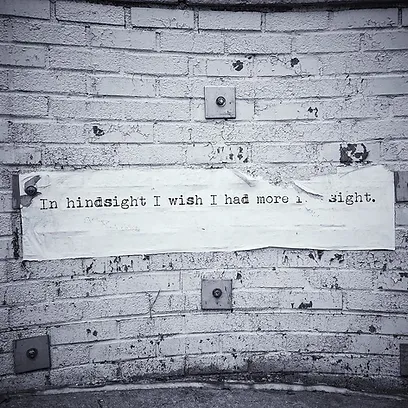“What if you didn’t necessarily do the wrong thing, you just know more about the situation to make a different call next time”
Hindsight bias – it’s a thing. We all have those moments in life where we look back and wonder why we didn’t do something differently – whether clinical veterinary cases, or in our every day lives. It’s human nature to try and create a “you should have seen this all along” narrative after the fact, but it’s important to remember that hindsight is indeed 20-20. When we look back with more information, we can often feel we should have seen something, and forget in that moment of retroflection that we do indeed have a clearer view of the situation.
The negative voice in our head can be particularly loud when it comes to these situations. “This should have been obvious,” it says. “You missed that, you’re not good at your job.” It’s easy to fall into the trap of self-criticism and judgement, but what if we looked at things differently? Instead of beating ourselves up over past mistakes, what if we acknowledged that we did the best we could with the information we had at the time? What if we recognised that we didn’t necessarily do the wrong thing, but rather we just know more about the situation now to make a different call next time?
As a vet in clinical practice, I used to struggle with this all the time. I would make a call on a case, and the next vet who saw the patient would sometimes make a different call. I would start to doubt myself and wonder if I had made the wrong choice. I’d often create all manner of stories about being judged or not being good enough – in fact, I tried to remedy this by always seeing my cases back myself, even coming in on days off if a client couldn’t make any other time. This didn’t work, I ended up overworked and on the route to burnout. The truth is, if a colleague did see a case of mine and decided to take another treatment path, that the other vet was presented with a completely different story, presentation, and stage of disease. They may have made the same initial call I did, but now they have the benefit of a full history to see what didn’t work as planned.
The negative voice in my head would tell me that I was a terrible vet and that everyone hated me. But looking back, I realise that it was just my brain’s way of trying to create a narrative that wasn’t necessarily accurate. The reality is that we all have moments of self-doubt and uncertainty, but that doesn’t mean we are failures. That negative voice isn’t me.
Reflecting and learning from our past experiences is important, but it’s crucial to do so from a place of kindness and self-compassion. We need to treat ourselves in the same way we would treat a cherished colleague or friend – and that absolutely does take practice, but is possible. We can only do our best with the information we have at any given time, and that’s okay. Sometimes we do need to reach out and talk something through with a friend, colleague or loved one (or even Vetlife) – and that’s also ok.
In the end, the key is to recognise that hindsight bias is a natural part of the human experience. We care about our cases, so we do wonder what we could have done differently. We can acknowledge hindsight, learn from it, and move forward with a greater sense of understanding and compassion for ourselves and others. So the next time you find yourself stuck in that negative voice of self-criticism, try to reframe the situation and remind yourself that you did the best you could with what you had at the time – and maybe, if it feels right, see if there’s a learning to glean.


